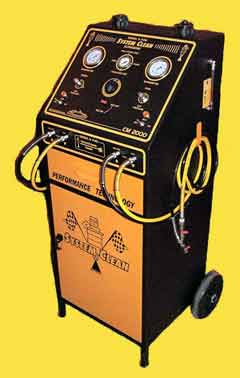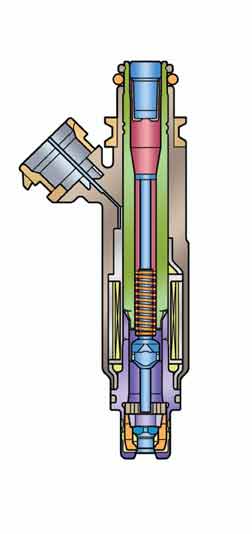Today, there are many drivers who never drove a vehicle that didn't have electronic fuel injection. Carburetors, what are they? Likewise, they never had to warm up an engine, flooded an engine or used a choke. Electronic fuel injection, which is celebrating its 40th birthday, virtually eliminated these, and many other problems as well as give us cleaner air.
As point of history, Bosch's D-Jetronic was the world's first electronically controlled gasoline injection system installed into a production car. It was first use in the 1967 Volkswagen 1600 LE/TLE. The big objective of EFI was to clean up exhaust emissions to meet more stringent smog regulations starting with those implemented by California's Clean Air Act in 1967. By 1972, only five years after introduction, 18 manufacturers were using the Bosch technology in mass production vehicles.
While today's EFI systems are much more trouble-free, especially compared to the carburetors, mechanical fuel injection and throttle body injection that preceded them, they can still give problems. The most common is fuel deposits on injector tips that alters the injection pattern and fuel flow volume. Symptoms of this problem include stalling, hesitating, hard starting, power loss and reduced mpgs.
One way to prevent injector deposits is to drive frequently and for longer distances. Injectors are designed to spray a fine mist of fuel through tiny holes in their tips. When the engine is shut off, some fuel remains, which because of the very high engine temperature, can evaporated leaving gum-like deposits. This changes the ideal conical spray pattern to an irregular one or even reduce fuel volume causing drivability problems. This is more likely to occur when you drive on only short trips. Therefore, an "Italian Tuneup," that is driving pedal-to-metal for an extended period, can often clean up injectors and solve the problem.
 An injector cleaner uses a solvent and high pressure to clean fuel injectorsFuel Injector Cleaner
An injector cleaner uses a solvent and high pressure to clean fuel injectorsFuel Injector Cleaner Gasoline producers advertise their "detergent" fuels with additives to prevent deposits as well as clean them up. Do they work? It depends on the brand and vehicle because refiners use different types and amounts. Thus, if you suspect a dirty injector problem, and it isn't the result of infrequent driving, fill up with a different brand. It may take a couple of fill ups to clean up deposits before you see a difference. Incidentally, since now all brand name gasoline grades contain detergents, there is benefit to purchasing premium grade fuel if your vehicle doesn't require it.
How about those bottles of fuel injector cleaners you find on shelves of auto parts stores and gasoline stations? Do you need them? Probably not, if you use a name brand gasoline that contains detergent additives. However, they may help with older vehicles with fuel injected engines that were driven on non-detergent gasoline for a long time. It may worth a try before removing injectors for replacement -- expensive -- or professional injector cleaning either on or off the engine -- somewhat less expensive.
Replacing the fuel-filter annually is probably less investment than a couple of bottles of off-the-shelve injector cleaners. While a clean filter will not prevent or cure injector problems, it will prevent dirt and other junk from clogging up the fuel system.





